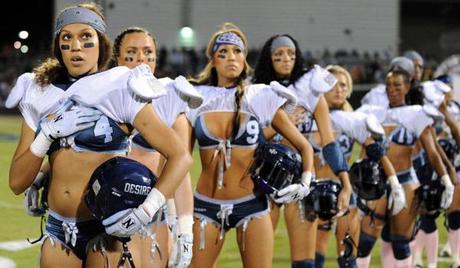Football seems to be the sport that excludes women the most. In this day in age we have women’s leagues for softball, baseball, and the WNBA, but football always had men in the spotlight being cheered on by cheerleaders on the sidelines. However, this is no longer the case. The Legends Football League, founded in 2009, is a women’s tackle American football league. These women are passionate about football, and they have a place to play: games are played in the spring and summer in professional men’s arenas and stadiums including those of the NFL.
In many ways the LFL seems like a feminist victory: giving women an opportunity to play football at a high level appears to be a step towards equality. Most teams are coached by former NFL coaches who are well known in their respective cities. However, players have complained that their uniforms do not offer adequate protection and the uniforms in general have created controversy. Up until 2013, the league was known as the Lingerie Football League and the uniforms, which consisted of bras and underwear with lace ruffles, reflected this. This blatant objectification was underscored by the league’s slogan: “True Fantasy Football”.
It seems that this objectification is the price these women pay to play the sport they love. And as we all know, sex sells. These women probably wouldn’t have had the chance to play football if they didn’t look appealing because they would not have an audience. I personally resent this and believe these women deserve the respect of legitimate uniforms that have protection. The league should be about the sport and the incredible achievements of these women, not just what they look like while doing it.
On the other hand, there have been some positive changes in uniform and branding: the league’s name was changed from Lingerie Football League to Legends Football League, their slogan was changed from “True Fantasy Football” to “Women of the Gridiron” in 2013 and the uniforms have also been altered to “performance wear” — which the founder of the league claimed was to “empower the women” and “shift more of the focus to the sport”. Although the uniforms are still revealing, they arguably give the athletes an opportunity to own their attractiveness, which does work to counter the stereotype of female athletes as overly masculine and unattractive. It’s also undeniable that the LFL has given women the opportunity to participate in football at all, which shouldn’t be overlooked.
Hopefully, the league will continue to evolve and facilitate more positive and truly feminist change. When women first started playing basketball, they wore skirts. Now, we have the WNBA. Other sports like track and field and volleyball also have very revealing uniforms. Women’s sports are still relatively new and although there are many improvements to be made, the existing leagues deserve some recognition for pioneering the effort to get women playing.


